
Our Blog

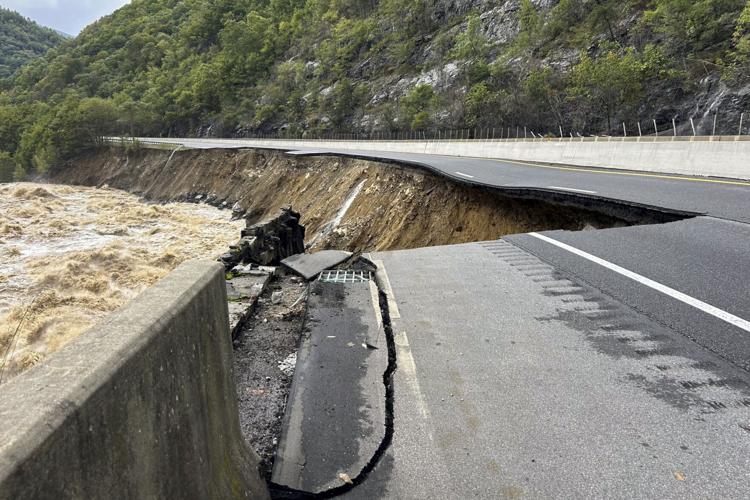
Hurricane Helene: How You Can Help!
We are finally slowing down to share some information here that we have been sharing in Facebook posts and synod e-news in the days since Hurricane Helene struck the Carolinas.
These are some important things to remember during this period of immediate rescue and response.
If you are having difficulties with cell phone service, RESTART YOUR PHONE. By simply turning it off and back on, you should be able to access emergency roaming, which allows any phone to access any cellular system, allowing for better service in affected areas.
Please DO NOT SEND STUFF unless the items have been specifically requested and you know that there is a location to store the supplies and someone ready to distribute them.
DONATE MONEY to a reputable organization (including the synod disaster fund, Lutheran Disaster Response). Your donations will go to those in need, purchase food, water, and supplies actually needed and requested, and will be delivered to a place that is set up and ready to receive them. As local stores begin to open, cash gifts or gift cards can be distributed by recovery agencies so that they can buy the items they need and support the local economy.
Assemble CLEANUP KITS (also known as flood buckets). These are going to be needed by the thousands. If you made some, make sure we know where they are located, and we will help get them collected and delivered to the right place for distribution. If you have not made any yet but would like to, there is still time. The list is available here.
This time will come to VOLUNTEER, but it is not time yet. Please do not self-deploy! Unless you are a trained professional, working with a rescue or repair crew, do not go into the impacted area. There is no housing, food, or water available for you, and it is difficult to purchase gas to get back home.
When there is work suitable for volunteers, LDR Carolinas will ask for volunteers or connect you with a group that needs volunteers. This will include work like debris removal, tarping, muck and gut, plus roof and home repair. This will happen when we do have the facilities available to support volunteers. That time will come, and it will last for many years. Ten years after Katrina, they were still rebuilding homes. Helene will be no different.
Your congregation can help in many ways. You might want to host volunteers (especially if you have showers) or help feed volunteers. You may create a volunteer team for when they are needed. You might host teams on their way to other locations affected by Helene in Georgia, Tennessee, or Florida. There are many ways to help, and they will all be needed in time.
As the immediate rescue and response to Hurricane Helene continues, we want to share some valuable information about moving into recovery.
First, anyone who has experienced residential damage should take photos before beginning cleanup in order to have documentation of the damage. It will provide proof of the furnishings you had that were destroyed or needed to be thrown away because they were wet or broken. These may be needed for insurance or FEMA claims.
We encourage everyone who has had damage due to Hurricane Helene to call Crisis Cleanup at 844-965-1386. (It is also still possible to call Crisis Cleanup for assistance after the No-Name Storm that caused severe flooding in Southeastern NC. That hotline is 910-218-1569. It will be closing on October 4.)
Crisis Cleanup helps homeowners receive volunteer assistance with tree and debris removal, tarping, and muck and gutting. Using this system helps volunteer organizations coordinate their work, and helps officials assess the needs in the community. A handbill and a flyer with pull-tabs are available for Hurricane Helene. You are encouraged to copy these and share them with others.
As contractors start showing up – as they do after every storm – make sure they are legitimate. If they offer a deal that sounds too good, it probably is. Pastor Rusty Kehl (Florence SC), who is a former contractor, offers a list of suggestions on negotiating with contractors.
After a home is flooded, it is important to remove the wet furnishings and building materials. There are volunteer groups that will help with this muck and gut process, and many organizations will be distributing cleanup buckets.
Many people plan to do their own cleanout, but a guide to Muck and Gut used for volunteer training by Lutheran Disaster Response gives guidance on completing the process safely. The steps are important to complete, so that mold will not become a problem in the home in the future.
Be sure to file for FEMA assistance if you are in an eligible county in western NC, upstate SC, or the Eastern Band of Cherokee. You must file before the deadline. Those deadlines are November 27 in North Carolina and November 29 in South Carolina. You can file online at www.disasterassistance.gov, download the FEMA app to your phone, or call 800-621-3362. A checklist of the information necessary to file is available here.
We encourage you to copy these resources and share them with others. Follow LDR Carolinas for more information. And as always, contact Ray or Ruth Ann with any questions!
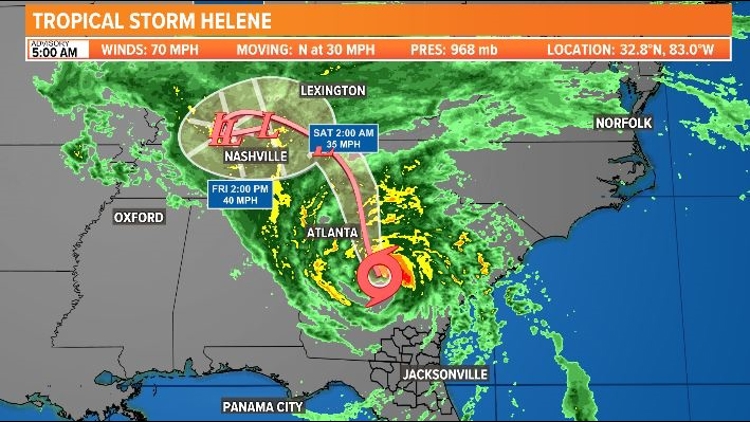
Hurricane Helene Response – September 27, 2024
Hurricane Helene has caused incredible damage here in the Carolinas. We are already receiving reports of downed trees, power outages, and most frighteningly, many flooded rivers and dams near collapse.
We have also received some questions about how LDR Carolinas can help in the aftermath of Hurricane Helene, especially as we begin to ask rostered ministers about the conditions in their congregations and communities. This post may be a lot of information to read and absorb in the midst of a disaster, but hopefully it will help others understand why we are asking for information about your local conditions!
At this point, as part of the NC and SC Synods, we are most concerned about damage affecting the congregations directly – specifically injuries to staff and members, and damage to the church buildings or to the parsonage or pastor’s home. Both synods have disaster funds. There is even a special campaign ongoing right now for the SC Synod Disaster Fund. Those funds make it possible for each synod to provide financial assistance directly to congregations affected by a disaster.
We want to support you and your congregations’ work in your own communities. Information about the conditions in your congregation and community helps us assess what resources we can suggest to you and helps us report useful information to our partner organizations. Lutheran Disaster Response is not normally one of the organizations that provides immediate relief following a disaster, but we do partner with other organizations through NVOAD (National Voluntary Organizations Active in Disaster). LDR Carolinas works directly with our partners in both the North Carolina and South Carolina VOADs.
LDR’s major strengths are in long-term recovery and disaster case management. Meaning that LDR can bring funding to the table to assist with the repair and rebuilding of homes in the months and years following a major disaster. In the Carolinas, that long-term funding and work is coordinated through our partner agency, Lutheran Services Carolinas.
Help is available. As LDR Carolinas, we do not have large teams of volunteers available to provide immediate assistance in your community, but many of our partner organizations through VOAD do. The American Red Cross and Salvation Army are two of our partners that provide shelter and feeding, and other organizations like Baptists on Mission, UMCOR (United Methodist Committee on Relief), and Team Rubicon ( a veterans’ organization) often provide the volunteer labor to help clear debris, tarp roofs, and begin mucking out flooded homes.
To receive volunteer assistance with home damage from Helene, please register with Crisis Cleanup at 844-965-1386. In addition to registering for assistance with necessary work, this will also help officials assess the extent of damages in your community. More resources are available in both English and Spanish. Please let us know if you need them. We encourage you to share this information with everyone in your congregation and community!
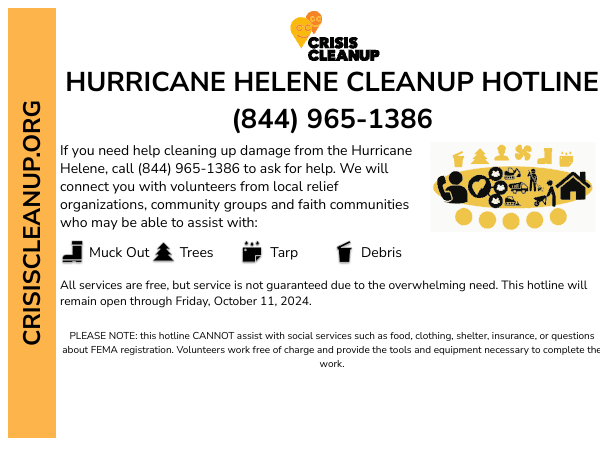
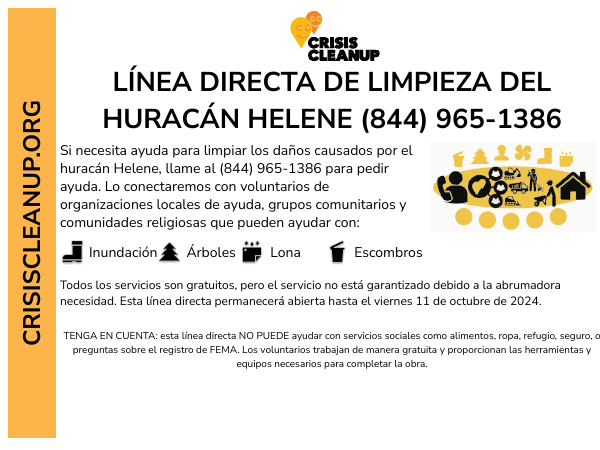
We do have the ability to request Solidarity Grants from LDR. These grants help provide for short-term unmet needs in an area affected by a disaster. Information from you about the needs in your community will help us prepare a grant request for these funds if they are needed. We also want to partner with congregational or community leaders who can help administer those funds in their area.
We would also welcome an opportunity to meet with pastors in your conference or to speak with your congregation to explain more about the work of LDR Carolinas, especially our two focuses of promoting disaster preparedness and developing a network of individuals and congregations in the Carolinas who are prepared to respond when a disaster occurs.
Let us know if you can help! Volunteers are needed to help with the cleanup, but please DO NOT self-deploy. If you are available to help, let us know and we will help you connect with other organizations already at work in the area.
Volunteers are also needed to take phone calls to Crisis Cleanup. This can be done from your own home on your own schedule. All you need are basic computer skills. Let us know if you would like to help, and we will help you get the brief online training.
We continue to pray for all those who have been affected by Hurricane Helene (along with previous disaster recoveries that we are still assisting with here in the Carolinas)!
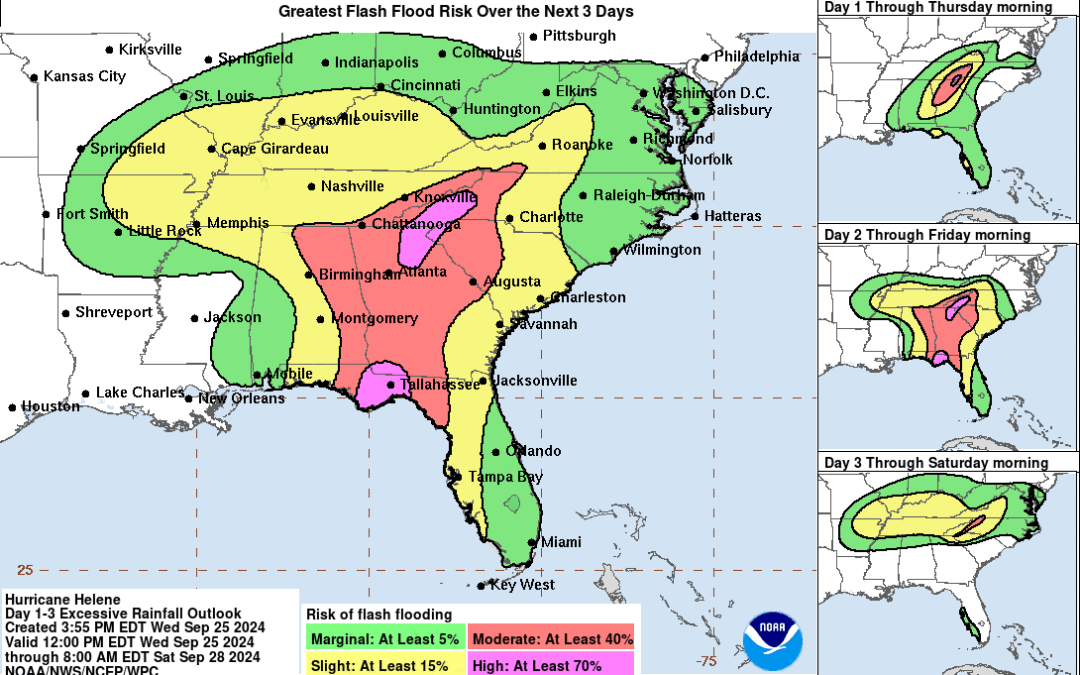
Update: Hurricane Helene
As Hurricane Helene Approaches Let Us Pray for All Who Are in Its Path:
Loving God, in the communion of Christ, we are joined with the trials and sufferings of all. Be with those who endure the wind and rain. Protect those in the path of danger. Open the pathway of evacuations. Help loved ones find one another in the chaos. Provide assistance to those who need help. Ease the fears of all and make your presence known in the stillness of your peace; Through Jesus Christ, our Savior and Lord. Amen.
(From Worship Resources for Natural Disaster)
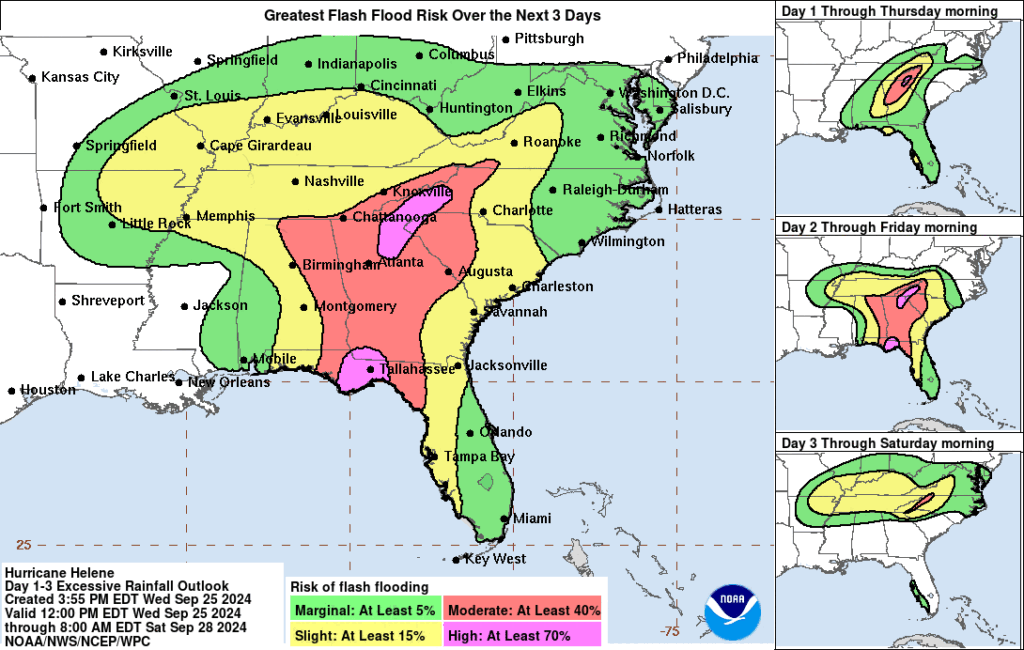
A state of emergency has been declared by both Governor Roy Cooper in North Carolina and Governor Henry McMaster in South Carolina as Hurricane Helene continues to increase in intensity. Helene is forecast to make landfall in Florida as a major Category 4 hurricane and advance through Georgia as a category 1 hurricane. All of South Carolina and most of Western North Carolina are under tropical storm warnings. Tropical Storm winds and heavy rain (up to 12 inches) are predicted for most of the western parts of both states. Areas east of the eye of the storm are more likely to experience tornadoes.
On Friday, travel is not recommended. Heavy rain, flash flooding, and tropical storm force winds will make driving very hazardous. Stay home! If you have not prepared to shelter in place for at least 3-5 days, do it now. With recent rains, more rain and wind will make many roads impassable with downed trees and it may take several days to clear roadways. Do not drive through flooded roadways. You cannot see if the pavement is still there, or if it has washed out. Turn Around! Don’t Drown!!!
Here are some things to consider NOW:
- Be following weather information from a reliable source, like the National Hurricane Center or your local National Weather Service office to know what to expect in your area.
- Be sure you have a way (or multiple ways) to receive weather updates even if the power is out.
- Locate your flashlights or another light source in case of a power outage. Check your supply of batteries or lamp oil and stock up if you need more.
- Secure outdoor furniture and other items to prevent them from being damaged or becoming airborne in high winds and causing other damage.
- Take time now to check out your generator and purchase fuel if you need more.
- Charge your laptop computer, cell phones, and other devices and keep them charged.
- Be sure that you have the necessary supplies to be at home for 3 to 5 days without power. Consider how much water, food, medications, paper goods, and pet food you may need. Remember that you will need food that you can eat without heating if the power is out.
- Have cash on hand in small bills for emergency purchases.
For more information on resources needed to shelter at home, please go to www.ldrcarolinas.org/resources, or www.ready.gov, www.readync.gov, or www.scemd.gov
Follow www.facebook.com/ldrcarolinas for more updates. We will share the latest information as the storm approaches. Arrival for wind and rain is predicted to being late Thursday evening for the Carolinas. Your preparations should be done by then so you can plan to stay home and safe.
If your home is damaged, please report it to www.crisiscleanup.org/disasters. That will help you secure volunteer assistance and help officials complete damage assessments following the storm.
For ELCA rostered leaders in North or South Carolina, if you, your home, your church building, church members, or the homes of congregation members are impacted by this (or any other disaster), please contact your bishop and the LDR Carolinas coordinators.
If you would like updates directly from LDR Carolinas, please join our network here.
